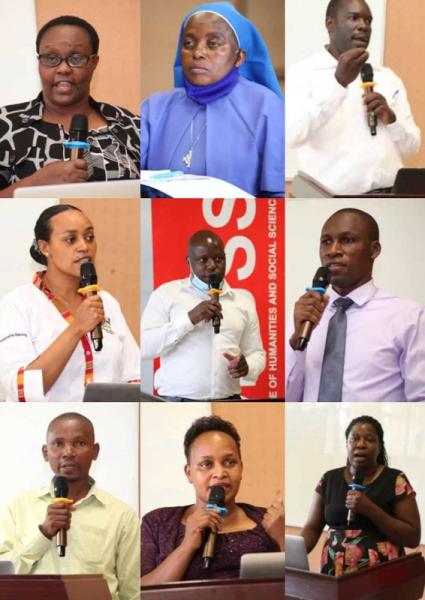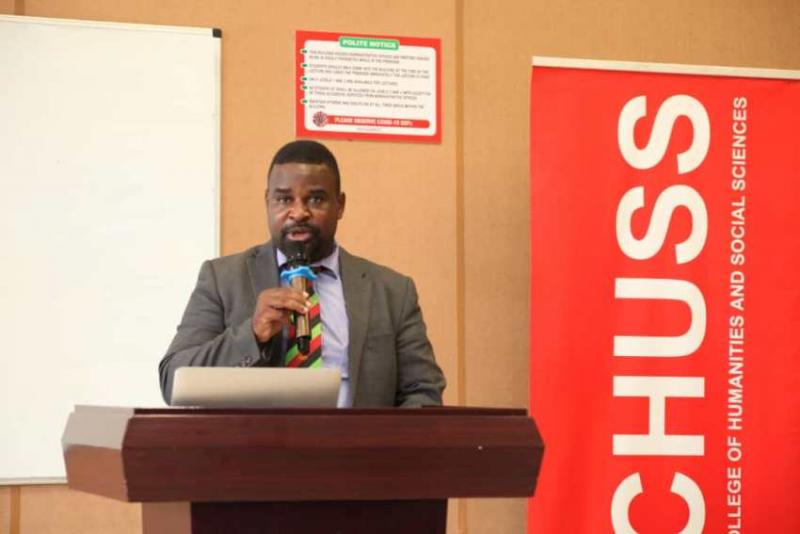
PURPOSE OF THE WORKSHOP: To check the progress of PhD students and provide feedback on their research
As part of the measures to check the progress of graduate students and help them improve their research, the College of Humanities and Social Sciences (CHUSS) holds periodical workshops at which students present their work.
On Friday,13th November 2020, the College held a workshop at which the PhD students sponsored by the Andrew W. Mellon Foundation and Gerda Henkel Stiftung presented their  progress reports. The students namely; Nicholas Tunanukye, Longbaam Alli Gloria Naantoe, Akampurira Patience, Namukasa Jacqueline, Cheromoi Clare, Semulende Robert, Aturinde Emmanuel, Ngonela Auchi Samuel, Helina Befekadu Bekele, John Baptist Imokola, Bazilio Kamya, Anne Jepkemboi, Nixon Wamamela, Agatha Tumwine, Richard Balikowa, Lynda Nakalawa, Antwiwaa Stella and Nansikombi Proscovia are researching on a broad range of issues including; conflict management, corruption, media management, colonial and post-colonial education policies, gender-based violence, women’s participation in politics and peace operations, Christianity and politics, peace building and constitutional democracy.
progress reports. The students namely; Nicholas Tunanukye, Longbaam Alli Gloria Naantoe, Akampurira Patience, Namukasa Jacqueline, Cheromoi Clare, Semulende Robert, Aturinde Emmanuel, Ngonela Auchi Samuel, Helina Befekadu Bekele, John Baptist Imokola, Bazilio Kamya, Anne Jepkemboi, Nixon Wamamela, Agatha Tumwine, Richard Balikowa, Lynda Nakalawa, Antwiwaa Stella and Nansikombi Proscovia are researching on a broad range of issues including; conflict management, corruption, media management, colonial and post-colonial education policies, gender-based violence, women’s participation in politics and peace operations, Christianity and politics, peace building and constitutional democracy.
During the workshop, the students presented chapters from their PhD theses to which participants, mainly their supervisors and other academics within the University made enriching contributions. Chapters presented included; A History of the Implication of Migrancy, Nativism and Citizenship in Uganda, 1894-1995: A Case of Western and Southern Uganda by Nicholas Tunanukye; Specific State and Society Strategies of Conflict Management within the Middle-Belt: 1957-2018 by Longbaam Alli Gloria Naantoe; Politics of non-restoration of Ankole Kingdom in Uganda, 1910-2018 by Akampurira Patience; Territorial Conflicts in East Africa: A Case Study of the Migingo Island Conflict between Uganda and Kenya 1926-2009 by Namukasa Jacqueline; The Complex Origins, Patterns and Evolution of Political Corruption in Uganda between 1962 and 2017 by Cheromoi Clarke; and An Investigation into the Techno-Archaeological Potential in Sango Bay, Southern Uganda by Semulende Robert.
Other presentations included; Women in Peace Operations: Debates and Trajectories of Gender Integration in Uganda's Military by Aturinde Emmanuel; The Structure of Peace-building in Kenya by Ngonela Auchi Samuel; State and Non-State Actors' Collaboration: The Case of Women Farmers' Empowerment in Ethiopia by Helina Befekadu Bekele; The Political Economy of Television Local Content Quotas in Uganda: How Cultural Regulation Remains a Fallacy by John Baptist Imokola; Analysis of Colonial and Post-Colonial Education Policies in Uganda: The Major Milestone in their Development by Bazilio Kamya; The Growth and Development of sugarcane plantation agriculture in Busoga subregion: Jinja and Mayuge Districts by Anne Jepkemboi; A Critique of Constitutional Democracy in Legislations in Uganda: A Case of the 1967 and 1995 Constitutions by Nixon Wamamela; Losses and gains: A stylistic analysis of the translation process of Folktales from Runyankore-Rukiga into French by Agatha Tumwine; Children's Experiences and Perspectives on Gender-based Violence in Busoga Sub-region, Uganda: A Sociocultural Exploration by Richard Balikowa; The Dilemma of Youth Empowerment in Uganda: Interrogating the Mindset Question by Linda Nakalawa; She-who-would-be King: Women's Participation in Politics by Antwiwaa Stella; and Christianity and Politics; Uganda Joint Christian Council (UJCC) and the Monitoring of National Elections in Uganda, 1963-2016 by Nansikombi Proscovia.
Following their presentations, the students were, among other issues advised to clearly state the problem and ensure the significance of the research is linked to the problem statement. They were also advised to clearly state the contribution of their research to the existing body of knowledge, and to ensure the research is theoretically grounded.
According to the Coordinator of the Andrew W. Mellon Foundation and Gerda Henkel Stiftung projects at Makerere University, Dr Edgar Nabutanyi, the students are in the final stages of completing their studies and some have submitted their theses.
Speaking at the workshop, the Deputy Director, Directorate of Research and Graduate Training (DRGT) at Makerere University, Dr Robert Wamala who represented the Director  appreciated the College leadership and supervisors for enabling the student to complete in record time. “This is a huge lesson to us as a university because it affirms that students can finish their training in the stipulated timeframe of 3 years if supported. To us the administrators and supervisors, it is a reality check- that if we put our mind to it, we can change the narrative that our graduate students take long to complete,” he noted.
appreciated the College leadership and supervisors for enabling the student to complete in record time. “This is a huge lesson to us as a university because it affirms that students can finish their training in the stipulated timeframe of 3 years if supported. To us the administrators and supervisors, it is a reality check- that if we put our mind to it, we can change the narrative that our graduate students take long to complete,” he noted.
Dr Wamala commended the College leadership for creating platforms that enable students and academics to exchange views. “I congratulate all the PhD students who will be sharing with us your work today. This is indeed an important milestone in your work because two years ago you came here with an idea and ambition. Now you have a chapter or chapters of brilliant work to share with us. In the life of any PhD student there are 5 important milestones, namely, getting provisional admission, full admission, submission of the thesis, examination and graduation. While the above milestones are in the full glare of society, it is the small and incremental steps like collecting data, writing and sharing your work in progress that are very important in your journey although done privately. I thank CHUSS for creating this platform for you to share and get feedback on your work,” he said.
He extended gratitude to the Andrew W. Mellon Foundation and Gerda Henkel Stiftung for the enormous contribution towards research and other academic activities at the College of Humanities and Social Sciences, Makerere University.
Dr Wamala appreciated “the great work being done by the College” that is substantially contributing to the revival of an intellectual culture in the University. “The Directorate of Research and Graduate Training takes pride in the reinvigoration of CHUSS encapsulated in the common statement on various university forums that: CHUSS is on the move. CHUSS is indeed on the move. In the last couple of months, we have gathered to engage in intellectual discussions convened by the CHUSS Symposium, and the numerous research dissemination events of projects supported by the Makerere University Research and Innovations Fund (Mak-RIF). The College also recently launched a Centre of Excellence in Research, Teaching and Learning (CERTL) to re-equip and revitalize faculty, graduate teaching fellows, and graduate students in Uganda and across the region with skills in research, academic writing, teaching and learning. This is indeed a great achievement. I once again thank our development partners for the contribution towards improving scholarship in the Humanities and Social Sciences at Makerere,” he said.
 In her remarks, the Principal of CHUSS, Dr Josephine Ahikire emphasized the importance of graduate research workshops and other academic engagements noting that it is through such encounters that students keep motivated and complete in time. She thanked the Andrew W. Mellon Foundation and Gerda Henkel Stiftung for the unwavering support towards PhD training and other academic activities at CHUSS. In addition to the support rendered towards various academic and research programmes at CHUSS, the Andrew W. Mellon Foundation has supported seven students to pursue their PhD studies. In 2019, Gerda Henkel Stiftung in Germany, which has supported PhD training of 30 members of staff and students in the last three years, extended its cooperation with the College and committed to support more 60 PhD fellows for the next six years starting 2020.
In her remarks, the Principal of CHUSS, Dr Josephine Ahikire emphasized the importance of graduate research workshops and other academic engagements noting that it is through such encounters that students keep motivated and complete in time. She thanked the Andrew W. Mellon Foundation and Gerda Henkel Stiftung for the unwavering support towards PhD training and other academic activities at CHUSS. In addition to the support rendered towards various academic and research programmes at CHUSS, the Andrew W. Mellon Foundation has supported seven students to pursue their PhD studies. In 2019, Gerda Henkel Stiftung in Germany, which has supported PhD training of 30 members of staff and students in the last three years, extended its cooperation with the College and committed to support more 60 PhD fellows for the next six years starting 2020.
The Principal also thanked the Directorate of Research and Graduate Training for its support towards the improvement of graduate research at CHUSS and in the entire University.
The Deputy Principal, Dr Julius Kikooma underscored the importance of mentoring the next generation of humanities and social sciences scholars. He thanked the project team for reinvigorating the humanities and social sciences scholarship through various programmes funded by the Andrew W. Mellon Foundation and Gerda Henkel Stiftung.
See abstracts of the students in the attachment below.
